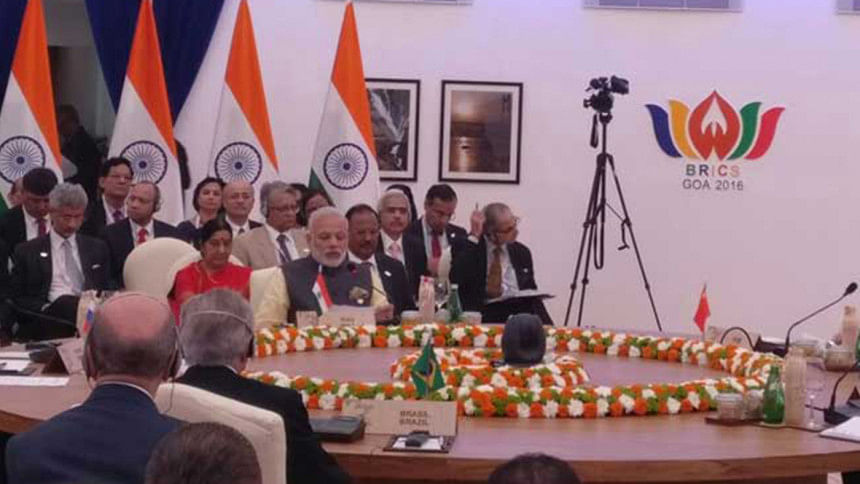Isolation of Pakistan will not isolate terror

Indian Prime Minister Narendra Modi has labelled Pakistan as a "mother ship of terrorism" at a summit of the BRIC nations held in the Indian state of Goa last Sunday. He scathed the inveterate foe of his country for "nurturing a mindset that terrorism is justified." The premier was within his rights when he spoke those words, because he was fishing for support against a sworn enemy, which has been a thorn in India's side. He, however, left much unsaid in his verbal "surgical strike" against Pakistan, addressing the symptom and ignoring the cause.
Pakistan, no doubt, has unwittingly turned itself into a breeding ground for terrorism. Some terrorists are of Pakistani origin, and many have been brainwashed and trained in Pakistan. The Pakistani politicians, like kids heady with money and easy life, allowed their country to be used as pantry for the American manoeuvres. When the Russians invaded Afghanistan, Pakistan was made to think it was an important ally of the United States at a crucial juncture of the Cold War. Not to speak of the billions of dollars the US gave, some of that money lining up the pockets of many Pakistani leaders.
We don't know if these leaders are feeling sorry now that the US lawmakers introduced a bill in the Congress to designate Pakistan as a state sponsor of terrorism. These days, India and the USA are so tight that when one sneezes another catches a cold. The campaign in the US was followed by an Indian lawmaker submitting a resolution in the Rajya Sabha to declare Pakistan a terror state.
Although the moral high ground no longer looks high! It's a longstanding practice in global politics that powerful nations interfering in weaker countries want to cuddle the baby to get to the mother. For nearly half a century, the war on communism was used as an excuse to tinker with the affairs of other countries. The WMDS were invented to create ground for invading Iraq. The false hope of the Arab Spring was ignited to unsettle the Arab nations culminating in the nightmare that's drawing Syria into an ever-escalating civil war.
By definition, terrorism is the human tendency to use violence to affect politics. That being so, who created the Mujahedeen, the Taliban, the al-Qaeda and, now, the ISIS? And, how were these militant outfits created to serve what interests?
This is by no means intended to exonerate Pakistan. The country has been stewing in its own juice since the Russians left Afghanistan and the American interest dried up. What about the fighters who fought, the mines that still lay buried, arms and ammunitions in thousands of trigger-happy hands, and the sudden vacuum in the minds of people, who were fired up to fight for a cause?
The Pakistani leadership must take blame for failing to plan how to clean up the mess after the Russian withdrawal and American desertion. They surely have a track record of failed vision and characteristic arrogance that led to the bifurcation of the country in 1971. It's unfortunate for the ordinary people of Pakistan that they have been crushed like chillies between an overbearing aristocracy and an ambitious military-industrial complex.
India today is forging a strong alliance with the same superpower whose ties with Pakistan it resented for many decades. Maybe, its leaders have more wisdom not to fall prey to sinister designs like Pakistan did. Maybe, they know when to pull out before the relationship turns abusive and hurts national interests. But India shouldn't forget that it's romancing with a cunning suitor, who has cheated its neighbour.
Pakistan suffers the irony of a bomb-maker whose bomb has exploded in his hand. The terrorism Pakistan once pushed to terrorise the Russians is now terrorising Pakistan. The frequent attacks carried out on its schools, mosques, politicians and celebrities depict the horror of an autophagous nation that has turned on itself. If Pakistan has been sending death squads and suicide bombers to other countries, it's also getting high on its own supply.
India must learn from the mistakes of its newfound ally, which, after 9/11, mixed the pleasure of opportunism with the business of fighting terrorism. The end result has been a disaster. The United States invaded Iraq on false pretences and frantically hunted for an elusive Osama bin Laden in the mountains of Afghanistan. While these two countries are struggling to recover from the ravages of wars imposed on them, terrorism has spawned worldwide wanton like blight.
India might succeed in isolating Pakistan, but it will not isolate terror. Distancing from the fuse has never defused the bomb.
The writer is Editor of the weekly First News and an opinion writer for The Daily Star.
Email: [email protected]

 For all latest news, follow The Daily Star's Google News channel.
For all latest news, follow The Daily Star's Google News channel. 



Comments